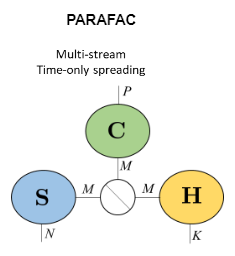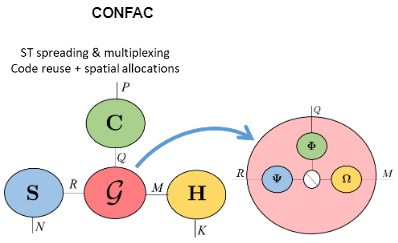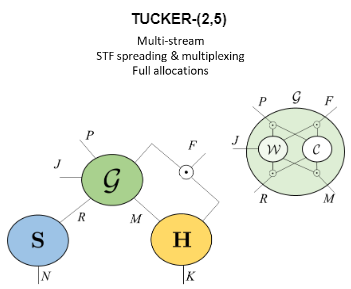Tensor decompositions have proven useful for designing different transmission structures for MIMO-OFDM systems with built-in blind detection. Transmission schemes combining diversity, multiplexing, and spatial reuse of codes have been formulated by explicitly exploiting the multilinear algebraic structure of tensor decompositions at both the transmitter and the receiver. On the one hand, modeling flexible space-time-frequency (STF) transceivers requires more general tensor decomposition structures beyond the well-known PARAFAC model. On the other hand, efficient algorithms are required for channel estimation and blind symbol decoding with guaranteed uniqueness.

Figure 8(a). Graph representation of the PARAFAC decomposition applied to model ST-coding (CDMA-based) MIMO

Figure 8(b). Graph representation of the CONFAC decomposition applied to model ST spreading & multiplexing MIMO systems with stream, code, and antenna allocations

Figure 8(c). Graph representation of the Tucker-(2,5) decomposition applied to model STF-coding MIMO systems
Applying innovative tensor signal processing schemes to wireless technologies provides a means to exploit the space, time, and frequency dimensions of signals to design (pre)coding schemes, multi-dimensional sensing signals and blind multiuser decoding receivers.
[1] G. Favier, A. L. F. de Almeida, “Tensor space-time-frequency coding with semi-blind receivers for MIMO wireless communication systems,” IEEE Transactions on Signal Processing, vol. 62, no. 22, pp. 5987-6002, 2014.
[2] A. L. F. de Almeida, G. Favier, J. C.M. Mota, “A constrained factor decomposition with application to MIMO antenna systems,” IEEE Transactions on Signal Processing, vol. 56, no. 6, pp. 2429-2442, 2008.
[3] A. L. F. de Almeida, G. Favier, L. R. Ximenes, “Space-time-frequency (STF) MIMO communication systems based on a generalized PARATUCK2 model”, IEEE Transactions on Signal Processing, vol. 61, n. 8, pp. 1895-1909, 2013.


